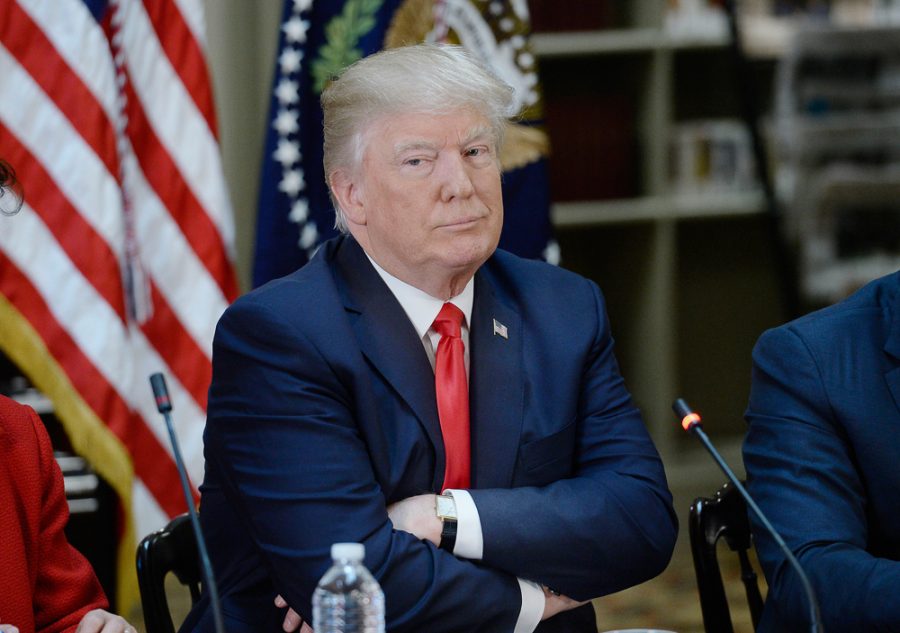Don’t blindly praise or denounce Trump’s actions
President Donald Trump dropped the “mother of all bombs” in Afghanistan on Thursday. Columnist Matt Silich says to not rush to judgements about Trump’s actions without first being informed.
Apr 16, 2017
 It started April 7, the morning after President Donald Trump authorized missile strikes against a Syrian air base in response to the Syrian government’s use of chemical weapons against its own people.
It started April 7, the morning after President Donald Trump authorized missile strikes against a Syrian air base in response to the Syrian government’s use of chemical weapons against its own people.
CNN’s Fareed Zakaria offered his take on TV the next morning, in what was undoubtedly a moment of high viewership for the news network as people sought to discover what happened in Syria and why.
“I think Donald Trump became President of the United States,” Zakaria said. “Candidate Trump had said that he would never get involved in the Syrian Civil War … President Trump recognized that the President of the United States does have to act to enforce international laws.”
Zakaria’s words were just one example of a frustrating trend in the news media, particularly the broadcast side, that occurs nearly every time the United States engages in military action: In lieu of more critical analysis and background information on the nature of the conflict, American viewers instead see pundits bloviating about various unimportant narratives.
There’s no justifiable reason for news coverage to be so focused on offering empty opinions, particularly the morning after such an attack. The same phenomenon occurred Thursday when the U.S. military dropped the so-called “mother of all bombs” in Afghanistan. Americans deserve to hear the who, what, when, where and why of military action before we jump into hot takes on Trump’s legacy.
Get The Daily Illini in your inbox!
A fun challenge for readers: Try to find a headline about the U.S. attack in Afghanistan on Thursday that doesn’t include a reference to the size of the bomb. I couldn’t find one.
Americans are obsessed with big things that blow stuff up. That isn’t new nor unexpected, but it’s still as disappointing as ever. And the coverage of Trump after the previous missile strike falls under the same category of modern news: romantically analyzing narratives that matter little when the world is at stake.
Zakaria even knows this. His weekly column for the Washington Post, which went up the same day he said Trump “became president,” was a more measured opinion that still praised Trump for his moral compass while questioning his possibly nonexistent strategy in Syria.
But instead of providing more of that analysis on the air, Zakaria instead pontificated about nothing. Some of that discrepancy can be accounted for because of the nature of live TV, and it’s understandable that one’s thoughts might not be quite as collected on air as in print.
But if that’s the case, perhaps CNN and other broadcast media outlets could wait a little longer before diving into narratives. It wouldn’t be too taxing to the network’s bottom line to spend time reminding viewers of how the conflict began in Syria and why it has escalated to this point.
Discussing why Barack Obama’s red line strategy with Syrian President Bashar al-Assad potentially led to this could help provide valuable context for current U.S. policy on the subject. More fact-based coverage would help viewers come to their own conclusions about whether such an attack was justified.
And maybe a day down the line — or at least, you know, a few hours — when the network’s journalistic responsibility to inform the public is fulfilled, one could hardly blame CNN for spending some time considering how the air strike affects Trump’s public perception.
Zakaria responded to numerous complaints in a column Thursday, when he said his detractors were simply victims of “Trump Derangement Syndrome,” incapable of expressing anything other than blind outrage toward the president.
Zakaria is partially right: It can be difficult not to judge everything Trump does with a broad brush when he has such a history of disturbing actions. That’s something liberals should try to be conscious of before immediately passing judgment.
But Zakaria also missed his hypocrisy. Regardless of how much he’d thought about his TV take, he explained little to none of his reasoning to viewers.
His reaction to the air strike in Syria instead just contributed to the media’s troubling culture of blind praise for military actions. And blind praise is no better than the blind outrage he so actively condemned.
Matt is a senior in Media.






